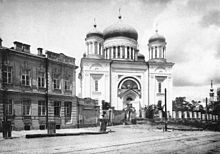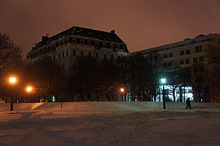Church of the Tithes
| Church of the Dormition of the Virgin | |
|---|---|
 The ruined Church of the Tithes in the 1650s, drawn by Abraham van Westerveld. | |
| Religion | |
| Affiliation | Eastern Orthodox Church |
| Province | Kyiv Metropolis |
| Rite | Ecumenical Patriarchate of Constantinople |
| Status | destroyed |
| Location | |
| Location | Kyiv, Ukraine |
| Geographic coordinates | 50°27′28″N 30°31′03″E / 50.4577777878°N 30.51750001°E |
| Architecture | |
| Type | Cathedral |
| Completed | 996 |
| Materials | Stone |
| Official name | Місто Володимира - дитинець стародавнього Києва з фундаментами Десятинної церкви |
| Type | Archaeology |
| Reference no. | 260010-Н |
The Church of the Tithes or Church of the Dormition of the Virgin (Ukrainian: Десятинна Церква, Desiatynna Tserkva;) was the first stone church in Kyiv.[1] Originally it was built by the order of Grand Prince Vladimir (Volodymyr) the Great between 989 and 996[1] by Byzantine and local workers at the site of death of martyrs Theodor the Varangian and his son Johann. It was originally named the "Church of Our Lady", in honor of the Dormition of the Theotokos. The church was ruined in 1240 during the siege of Kyiv by Mongol armies of Batu Khan.
Vladimir set aside a tithe of his income and property to finance the church's construction and maintenance, which gave the church its popular name.
On an initiative of the Metropolitan of Kyiv Eugene Bolkhovitinov, the church was rebuilt in the mid-19th century, but in 1928 it was once again destroyed by the Soviet regime.[1]
Medieval church
[edit]By Vladimir's order, the remains of his grandmother Princess Olga, the first Christian ruler of Rus', were reburied in this church.[2] Vladimir and his wife, Princess Anna, the sister of Byzantine Emperor Basil II, were also buried in the Church of the Tithes.
The church was seriously damaged in the fire of 1017 and was rebuilt by Yaroslav and rededicated in 1039.[3] In 1044, Yaroslav would make the church a mausoleum for Kyivan princes, having the remains of Yaropolk and Oleg baptised and interred.[2]
In 1171 and 1203, the church was sacked[3] and in 1240 it was used by Kyivans as the last refuge while the city was being ravaged by the hordes of Batu Khan,[3] when it finally collapsed from fire. Chernihiv's Saviour Cathedral (1036) is an extant structure supposed to reproduce the dimensions and exterior appearance of the original Church of the Tithes.

Replacement buildings
[edit]In the early 19th century, another metropolitan bishop, Eugene Bolkhovitinov, had the site excavated. Under his administration, a new church of the Tithes was built in stone (between 1828 and 1842).[4] Its Russian Revival design by Vasily Stasov had some deviations from the medieval original. In 1935, Stasov's church was destroyed by the Soviet authorities.

Plans for reconstruction
[edit]
A plan to rebuild the church is under consideration in Kyiv. Proponents of reconstruction point out the historical and political importance of rebuilding a church so significant in Eastern Slavic history. Opponents refer to the lack of any documentary descriptions or depictions of the original church, and that excavations were allegedly unable to determine the layout of its foundation. On 3 February 2005, the President of Ukraine, Viktor Yushchenko, signed a decree on the restoration of the Tithe Church, to which the state budget provides nearly ₴90 million ($18 million). In 2006, a temporary Orthodox tabernacle was illegally erected near the Tithe Church on the territory belonging to the National Museum of History of Ukraine without the appropriate documents. In 2007, the tent church was illegally replaced with a wooden one; in 2012, it was also illegally built in stone.[5][6]
On July 9, 2009, at a meeting of the Holy Synod of the Ukrainian Orthodox Church, it was decided to open the Nativity of the Blessed Virgin Desyatynnyi monastery in Kyiv and appoint as governor Gideon Archimandrite (Charon). In January 2010, Kyiv's Head of Urban Planning, Architecture and Urban Environment Design, Sergii Tsilovalnyk, reported that a platform will be built on the ruins of the Tithe church to serve as a foundation for the new church, which will belong to the Ukrainian Orthodox Church (Moscow Patriarchate).[7]

In January 2018, two men attempted to set fire to the 2007 (Ukrainian Orthodox Church (Moscow Patriarchate)) wooden church near the Church of the Tithes.[8] Also in January 2018, Ukrainian nationalist groups S14, Traditions and Order and Public Organisation "Sokil" dismantled the information board of this church.[8]
In January 2023, the Ministry of Culture and Information Policy called for the dismantling of the 2007 building in court.[8] According to the ministry, the building was illegally located on the territory of the National Museum of the History of Ukraine.[8] On 15 February 2023 the Commercial Court of Kyiv ordered the dismantling of the 2007 building.[9] On 17 May 2024 the 2007 building was dismantled after a crowdfunding by the museum[10] during which Russian propaganda channels spread fake information that mobile communication in the vicinity was blocked.[11] The company "Smile Construction" that dismantled the building transferred their payment to the Armed Forces of Ukraine for their fight against the Russian invasion of Ukraine.[10]
List of burials
[edit]Within its premises the church had a princely tomb.
- Pope Clement I
- Anna of Byzantium
- Vladimir the Great
- Olga of Kiev, reburied from Vyshhorod
- Yaropolk I of Kiev
- Oleg of the Drevlyans
The remnants of Anna of Byzantium and Vladimir the Great were first reburied in the Church of the Saviour and later in the Dormition Cathedral of Kyiv Caves Monastery. Some remnants were reburied in the Saint Sophia's Cathedral.
External links
[edit]References
[edit]- ^ a b c Mariya Lesiv, The Return of Ancestral Gods: Modern Ukrainian Paganism as an Alternative Vision for a Nation, (McGill-Queen's University Press, 2013), 105.
- ^ a b The Notion of "Uncorrupted Relics" in Early Russian Culture, Gail Lenhoff, Christianity and the Eastern Slavs: Slavic cultures in the Middle Ages, Vol. I, ed. B. Gasparov, Olga Raevsky-Hughes, (University of California Press, 1993), 264.
- ^ a b c The Earliest Mediaeval Churches of Kiev, Samuel H. Cross, H. V. Morgilevski and K. J. Conant, Speculum, Vol. 11, No. 4 (Oct., 1936), 482.
- ^ Michael F. Hamm, Kiev: A Portrait, 1800-1917, (Princeton University Press, 1993), 234.
- ^ "Біля підмурків Десятинної церкви ведеться незаконне будівництво храму УПЦ (МП): у Київраді б′ють тривогу". 2013-11-05. Archived from the original on 2013-11-05. Retrieved 2024-07-10.
- ^ "Біля фундаменту Десятинної церкви УПЦ МП завершує незаконне будівництво "малого Десятинного храму" | Експрес - онлайн". 2013-11-05. Archived from the original on 2013-11-05. Retrieved 2024-07-10.
- ^ Website Desyatinny Monastery of the Nativity of the Blessed Virgin "Home". Archived from the original on 2011-06-27. Retrieved 2011-06-03.
- ^ a b c d Stanislav Pogorilov (2023-01-12). ""The "temple" of the UOC of the MP near the Church of the Tithes must be dismantled, the point will be set by the court – Tkachenko". Ukrainska Pravda (in Ukrainian). Retrieved 2023-01-12.
- ^ Alona Mazurenko (2023-02-15). "The court ordered the dismantling of the "chrome kiosk" near the Tenth Church – Tkachenko". Ukrainska Pravda (in Ukrainian). Retrieved 2023-02-15.
- ^ a b Olena Ivashkiv (2024-05-17). "In Kyiv that night, a "temple MAF" was demolished illegally built in the UNESCO buffer zone". Ukrainska Pravda (in Ukrainian). Retrieved 2024-05-17.
- ^ "In Kiev, the Tithes Cathedral was demolished overnight by the authorities". The Russian Orthodox Church. Department for External Church Relations.
- Former buildings and structures of Kyiv
- 10th-century churches
- Vasily Stasov buildings and structures
- 996 establishments
- Religious buildings and structures completed in the 990s
- 1240 disestablishments in Europe
- Churches completed in 1842
- Buildings and structures demolished in 1935
- Demolished churches in Ukraine
- Stone churches
- Churches in Kyiv
- Demolished buildings and structures in Kyiv
- Volodymyrska Street
